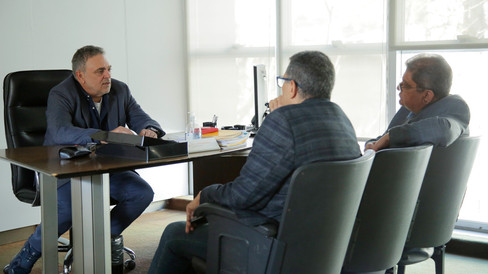Panama Moves Toward Its First Audiovisual Authors’ CMO with the Support of FESAAL and AVACI
- Oct 3, 2025
- 4 min read

In the past decade, Panama’s audiovisual sector has undergone a period of growth driven by the 2012 Film Law, which established a framework to support production, post-production, and distribution through competitive funding programs. This boost led to an increase from an average of one or two films per year to between six and eight feature films annually, in addition to documentaries and short films. Works such as Plaza Catedral (by Abner Benaim, 2022), which reached the semifinalist stage at the Academy Awards, marked a symbolic milestone for a country of just four million inhabitants and a limited audiovisual market.
However, this productive growth was not immediately matched by progress in the field of authors’ rights. In 2019, the creation of the Ministry of Culture raised expectations among filmmakers, but a lack of policy continuity and excessive bureaucracy within the National Directorate of Author’s Rights slowed the path toward true collective management.
Plaza Catedral (2022), directed by Abner Benaim
It was in this context that the Association of Writers, Screenwriters, Playwrights, and Audiovisual Directors of Panama (EDAP) was founded, presided over by Ricardo Aguilar, with Luis Romero as vice president. The entity was officially recognized in 2023 and began taking its first steps toward establishing a collective management organization that would enable Panamanian authors to collect remuneration for the use of their works, both domestically and abroad.
“In 2023, we received official authorization to operate from the National Directorate of Author’s Rights after a long and complex process,” recalls Aguilar. “Now we are at a key turning point: in October, we will hold a general assembly where the collection and distribution regulations will be put to a vote. Once approved and validated by the Directorate, we will be able to begin negotiations with the users of our works.”
Romero adds: “Our horizon is 2026. We want to reach that date with the collective management society fully operational and already achieving its first collections. This year and the next, we must meet the final legal requirements, but we feel this is the right moment: today Panama produces more films than it did five years ago, and that strengthens our legitimacy as authors.”
Training in Argentina: Learning from Experience
Ricardo Aguilar and Luis Romero traveled to Buenos Aires in September to visit Directores Argentinos Cinematográficos (DAC) and ARGENTORES as part of the training initiatives promoted by FESAAL (Federation of Latin American Audiovisual Authors’ Societies) and AVACI (International Confederation of Audiovisual Authors). There, they participated in workshops on internal procedures, work registration, management software such as AVSYS, and legal aspects of collective management organizations.
“The metaphor we use is that of a neighbor who has just moved into your neighborhood and doesn’t know how to get home when they’re just one block away: DAC already knows the way, and we’re learning how to walk it,” explains Romero to AV Creators News. “The training gives us that map — from how to register a work to how to set tariffs — everything serves as guidance.”
Aguilar agrees: “For us, it’s a huge challenge because we come from filmmaking, not from building administrative and legal structures. But the solidarity of organizations like DAC, and the support of FESAAL and AVACI, make this process less lonely. Every time we come to Argentina, we recharge: we see that it’s possible, that it works, and we leave knowing that we can achieve it too in Panama.”
Challenges and Expectations
The leaders of EDAP acknowledge that the greatest challenge lies in ensuring that the Panamanian government, through the National Directorate of Author’s Rights, actively supports the process.
“We have a good author’s rights law, but there’s a lack of political will to enforce it. The Directorate should serve the authors, but many times it ends up being an obstacle,” warns Aguilar.
Another challenge is engaging the new generations of filmmakers, screenwriters, and creators who in Panama often work independently through short films and music videos.
“We have about 40 members, but we know we can grow much more,” says Romero. “Membership in EDAP is free, which helps us invite young people. They already understand the importance of author’s rights — we just need to show them that there’s a collective path to defend it.”
Looking Ahead
The connection with international organizations has been decisive.
“The reciprocity we gain from being part of FESAAL and AVACI is immeasurable,” affirms Romero. “A Panamanian director can be sure that their rights will also be defended in countries as far away as Spain, Mexico, or Argentina. We come from a small country, and feeling that continental and global support is like a gift.”
Aguilar emphasizes the hope driving them forward: “What we want is that, just like in Colombia, Argentina, or Chile, Panama’s audiovisual authors have a strong society that represents them. It’s a long process, but each step brings us closer. And knowing we’re not walking alone — that we’re accompanied by sister organizations — is what keeps us moving.”
The consolidation of EDAP and the eventual creation of a collective management organization in Panama will mark a before and after for the country’s audiovisual authors. With a growing production sector, a film law that continues to generate opportunities, and the support of the international community, Panamanian directors are working to ensure that their films not only reach the screen but also the fair remuneration they deserve as creators.
































Comments